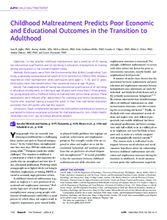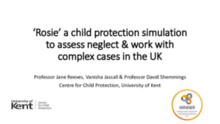Displaying 751 - 760 of 1177
This article describes the experiences of Muslim children in care in the UK and critically examines how their situation matches the definitions of good practice in agencies and professionals seeking to help them.
This article sets out the rationale for the Reflective Fostering Programme (RFP), outlines its key elements and concludes by indicating future service implementation and a planned feasibility study examining this approach.
The current study addressed gaps in evidence of growing early intervention in the form of out of home care through a comparison of two samples of children in Scotland: 110 children born in 2003 and 117 born in 2013, all of whom were placed under compulsory measures of supervision prior to three years of age.
This paper presents findings from an independent study of Ofsted inspections into children's social care in England, covering reports under three inspection frameworks during the period 2009 to 2016.
This thesis study aimed to explore what Looked After Children (LAC) value in their friendships in order to understand what support may help them gain the maximum benefits from these relationships.
The objective of this study was to test whether childhood maltreatment was a predictor of (1) having low educational qualifications and (2) not being in education, employment, or training among young adults in the United Kingdom today.
UBS Optimus Foundation is seeking an Associate Programme Director of Child Protection.
This presentation can be used concurrently with Kent University's simulation course, it presents a case study that allows students to engage in the complex topic of child neglect.
This article describes a "financial crunch engulfing local councils" in the UK which is leading "cash-strapped councils" to eliminate preventive services like parenting support groups and classes, youth schemes and Sure Start centres.
In this paper, the authors examine if and how care order proceedings could be improved in England, Finland, Norway, and California, USA, asking the judiciary decision‐makers about their views on what should be improved.


